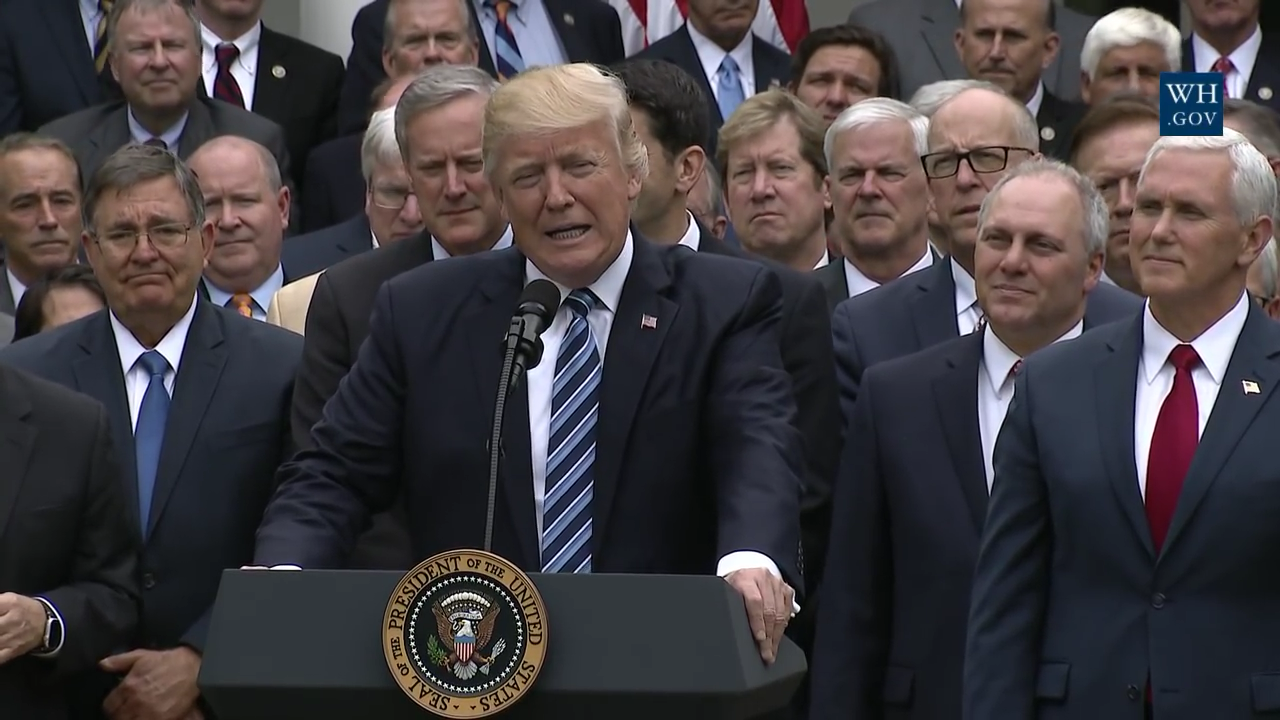The Health Care Albatross: What the AHCA House Vote Means for Republicans, Democrats, and Health Care in the USA

The American Health Care Act, the effective repeal of the Affordable Care Act (less affectionately, Obamacare), passed the House of Representatives on Thursday, May 4th with 217 votes.
The critical margin by which it passed was made so close by no more than twenty Republican voters who broke with party stance to vote against the bill. Conversely, no Democrats voted for the bill. The Affordable Care Act drew the ire of Republicans throughout most of the Obama Administration, and its repeal was a fairly universal goal among the party. This fact raises the question as to why these twenty members of congress voted against the AHCA.
Unsurprisingly, most of the Republican nay-voters are from competitive districts in the Northeast and Midwest. Eleven out of the twenty were from only four states: New Jersey, Pennsylvania, New York, and Ohio. Naturally, votes largely correlated with either a moderate or conservative leaning. And while on the one hand many moderates cited a lack of protection for patients with pre-existing conditions, on the other, conservative Republicans like Arizona congressman Andy Biggs could not bring themselves to support what they interpreted as a weak version of the anticipated “clean repeal” of the ACA.
The bill certainly had a rocky start, thanks to a scathing Congressional Budget Committee report that found that approximately 14 million more people would be left uninsured under the AHCA than under the existing ACA. This number would rise to 38 million over the next nine years, the report found. It was overwhelmingly the result of these findings that House Republicans were pressured to initially withdraw their tentative support for the bill, preventing the vote originally planned for March 23rd from being called and thwarting Republican ambition to make the bill an achievement of President Trump’s first hundred days in office.

As we have seen, hopeful critics on the left who saw this early failure as the effective death of the AHCA were decisively proved wrong just over a month later, when the bill was called to a vote and passed. President Trump and the GOP had successfully quelled the fears of –or perhaps put enough pressure on– just enough critics on both sides of the conservative spectrum: those of GOP moderates worried about widespread loss of coverage and those of ultra-conservative Freedom Caucus members worried that the bill does not go far enough to repeal Obamacare.
As for the midterm elections, Democrats seem to think that these votes will play a major role, with negative consequences for the overwhelming majority of yea-voters –conveniently, all Republicans. When Republicans left the House to board buses to the White House’s Rose Garden for a celebratory press conference after the House passed their version of the AHCA, they were greeted by Democrats chanting “goodbye,” a jeer illustrating a larger presumption that those who voted for the bill would lose their seats in the 2018 midterm elections. House Minority Leader Nancy Pelosi, for example, showed great confidence that American voters would turn on candidates found with this “scar” on their voting history.

Democrats need 24 seats to win back the House in November. The Congressional districts Republicans hold most weakly in the House are 23 “red” districts won by Hillary Clinton in the 2016 presidential election; however, of the members of Congress that represent those 23, nine voted against the bill. That leaves only fourteen seats in contention held by yea-voters, barely half of what Democrats need in November. This shows that to take back the House, it will not be enough to simply use this AHCA vote as a weapon against Republicans during the campaign.
Of course, that is not to say that Republicans who voted “no” will not be susceptible to backlash against the failed policies supported by their party in general. That said, it remains to be seen whether the policy will disenfranchise low- and middle-income voting populations as predicted. As a whole, this assumption speaks to a larger primacy of negative campaigning that has come to run amok in American elections.
Perhaps more insidious than negative campaigning are the tactics of lethargy that have led Democrats to wait for their opponents to burn themselves down rather than putting together a viable campaign strategy –complacency similar to what made the 2016 elections such an embarrassing defeat.
The bill still needs to go through the Senate, where it is expected to undergo major changes if it is to pass at all. If it does, and the consequences for lower-to-middle class Americans or those with pre-existing conditions are as severe as predicted, this bill will probably hurt Republicans in 2018 and will not necessarily leave those who voted against it unscathed, especially members of Congress in contentious districts.
Nevertheless, it will not be enough for Democrats to pursue a strategy of deriding the failures of the Trump administration to win back the House. Without candidates and policies that resonate with those low- and middle-income voters –the same voters that gave Trump the White House and whom the AHCA is predicted to most negatively affect– complacency will once again lead Democrats to defeat, all with the Republicans’ albatross notwithstanding.
The last remaining hope for health coverage in America? Assuming that Democrats will not have learned their lesson by November, with the AHCA in disrepute, room will be left for a single-payer system to emerge as the last viable option– something Trump can say he actually supported the whole time.
